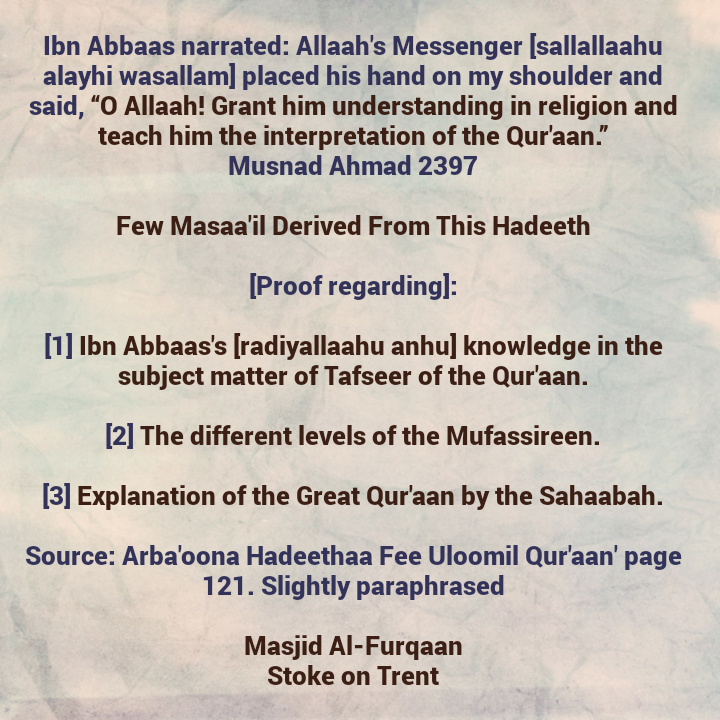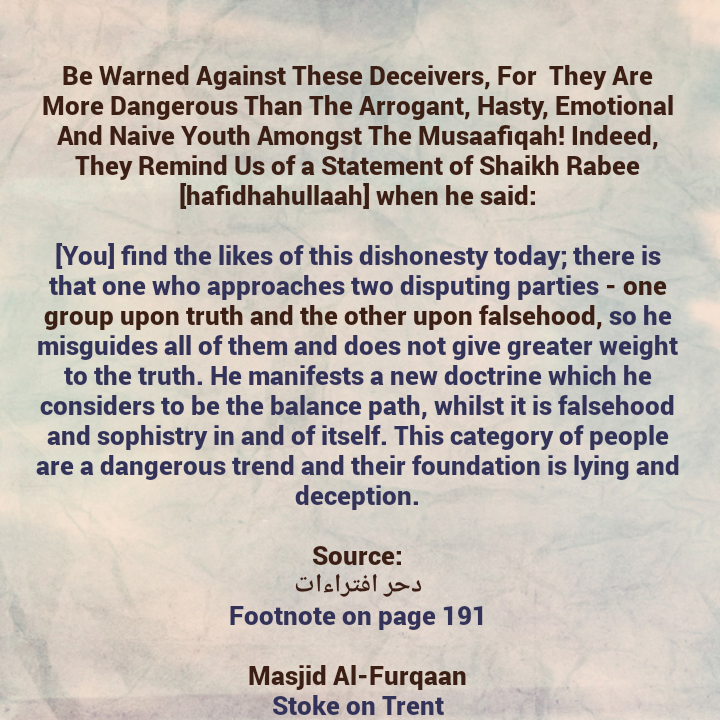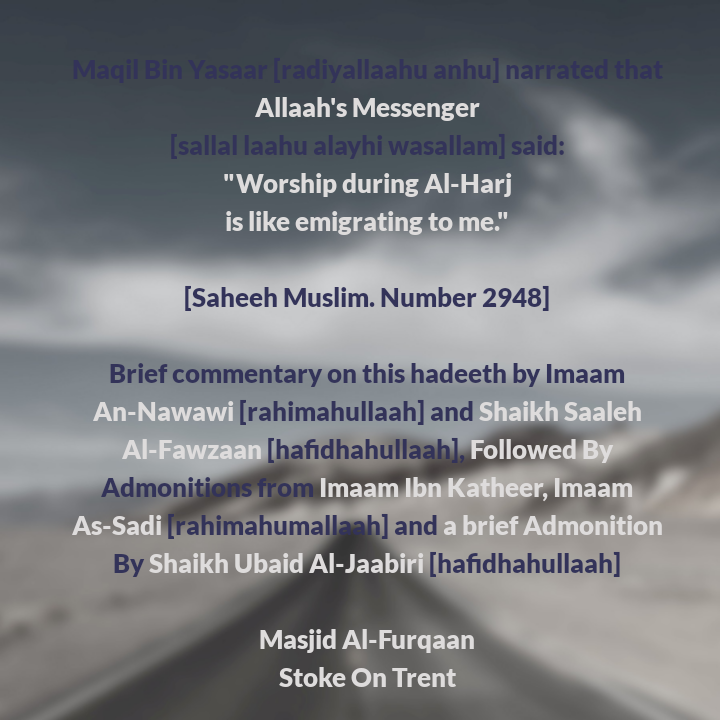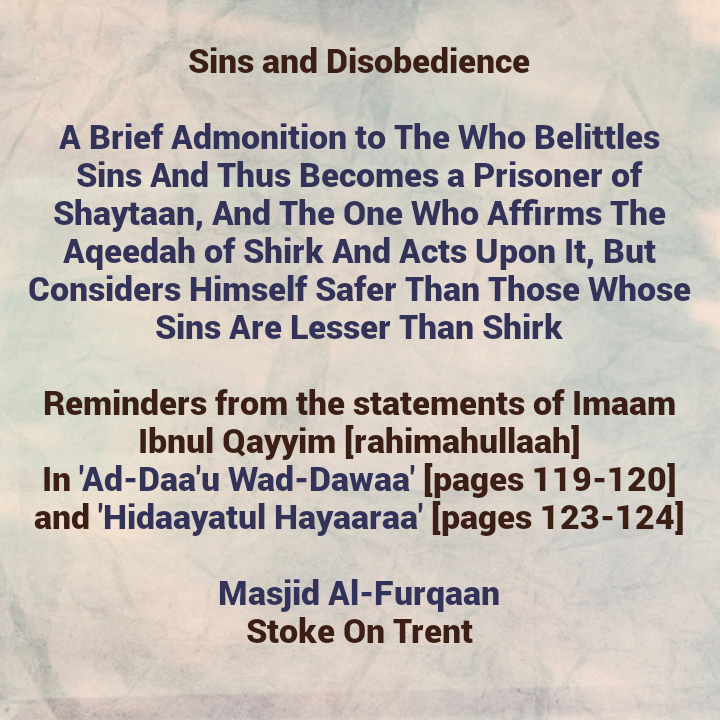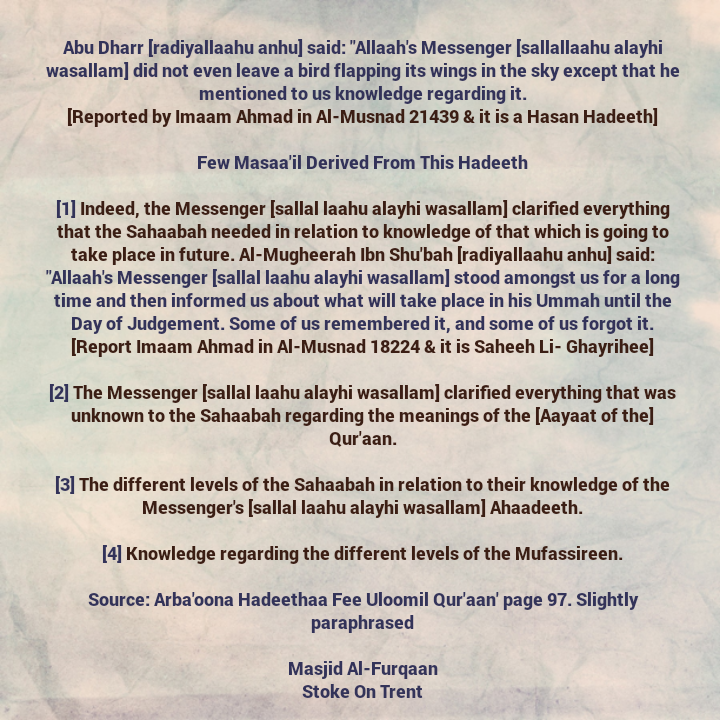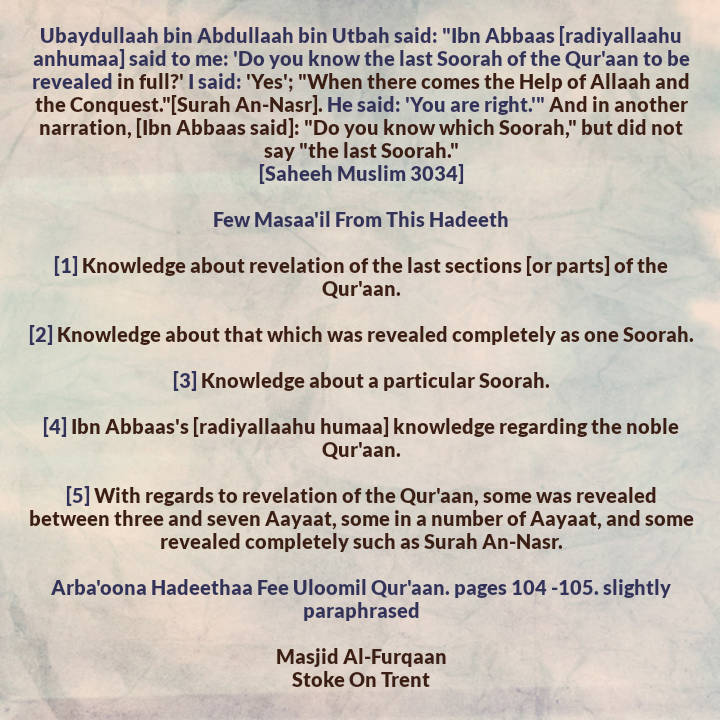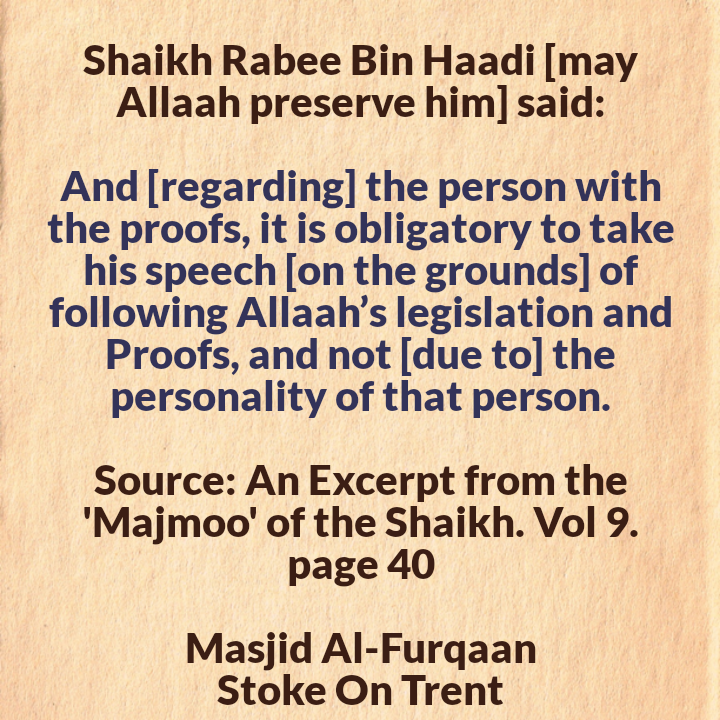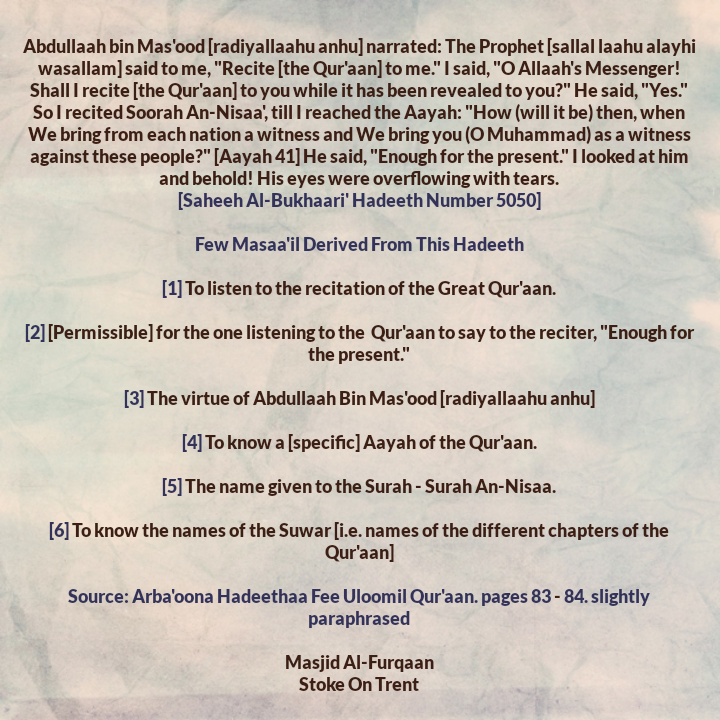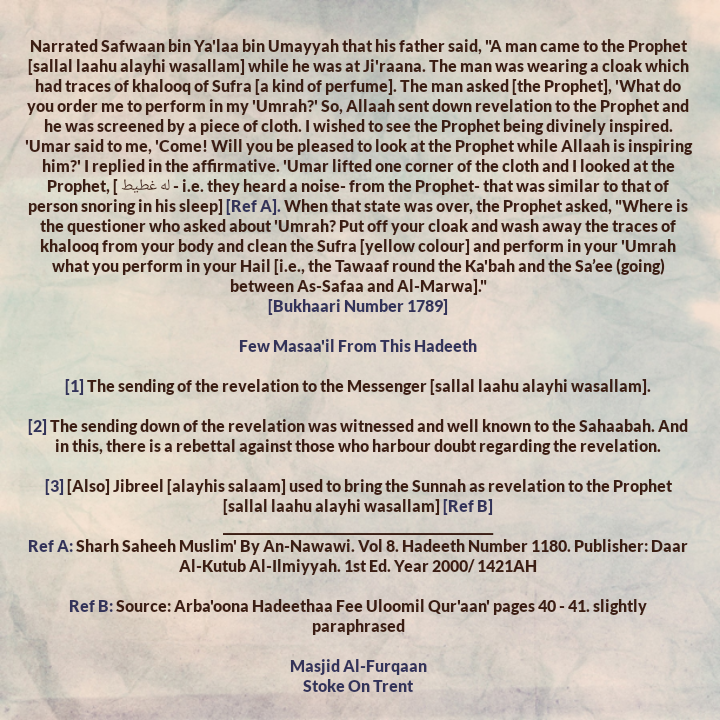In The Name of Allaah, The Most Merciful, The Bestower of Mercy
Maqil Bin Yasaar [radiyallaahu-anhu] narrated that Allaah’s Messenger [sallal-laahu-alayhi-wasallam] said: ”Worship during Al-Harj is like emigrating to me.” [Ref 1]
Imaam An-Nawawi [rahimahullaah] said:
The intent behind [the word] ‘Harj’ in this Hadeeth is when the affairs of the people are in a state of Ikhtilaat [i.e. chaos, confusion, disorder, dissarry etc]. And the reason behind the great virtue of worship during this state of affairs is because the people are heedless of worship and diverted from it, and none fulfils it except [some or few] individuals. [Ref 2]
Shaikh Saaleh Al-Fawzaan [may Allaah preserve him] said:
The intent behind [the word] Al-Harj is Al-Ikhtilaat [i.e. chaos, confusion, disarray] when it occurs between the Muslims. That is because many people are diverted from worship due to this state of confusion [chaos, disarray etc]. Also killing and blood shed occurs during this state of affairs. Allaah’s Messenger [sallal laahu alayhi wasallam] urges a person to engage in worship during the time of fitan, because the majority of the people are diverted from worship. The one who busies himself with worship [during this time] is like one who has migrated to Allaah’s Messenger [sallal laahu alayhiwasallam]. You know the virtue Al-Hijrah [migration]! Al-Hijrah in the Arabic language means to abandon. Allaah said: [وَٱلرُّجۡزَ فَٱهۡجُرۡ – And keep away from the idols][Al-Muddathir’ Aayah 5]
The One who engages in worship during times of fitan and it does not divert him from worship, he has the reward of one who migrated to Allaah’s Messenger [sallal laahu alayhi wasallam], because a Muhaajir [emigrant] leaves his country and flees to Allaah’s Messenger sallal laahu alayhi wasallam] in order to safeguard his religion, and took place in the early Islamic era – during the era of the Messenger [sallallaahu alayhi wasallam]. So, the word Hijrah [miration] in the Islamic legislation means to leave the land of kufr and settle in the land of Imaan in order to safeguard one’s religion.
The word Hijrah is also intended to mean abandonment in general, so the one who abandons Fitna and busies himself with worship, then indeed he has abandoned Fitna and proceeded towards worship. Therefore, Hijrah means to abandon something. Allaah’s Messenger [sallal laahu alayhi wasallam] said: A [true] Muslim is the one whom other Muslims are safe from his tongue and hands, and a Muhaajir [emigrant] is one who refrains from what Allaah has forbidden. [Ref A]
Therefore, he is a Muhaajir because he abandons what Allaah has forbidden and fulfils what Allaah has commanded. This Hadeeth urges [exhorts] a person to engage in worship during times of fitna, because Fitna diverts people from worship except the one whom Allaah blesses with the ability to abandon Fitna and engages in worship.
However, this does not mean that one refrains from warning against Fitna and clarifying for the people, rather – firstly – he abandons Fitna, warns the people and forbids them from it. That is because just as he would like the people to come to him with good, he should also go to them with good. Just as he loves to be safe from Fitna, he should also love the same for the people. This deed of his is Jihaad [striving in the path of Allaah] and Inkaarul Munkar [i.e. the virtuous act of rejecting evil]. [Ref 3]
Who to Return to During Times of Fitan
Allaah [The Most High] said:
وَإِذَا جَاءَهُمْ أَمْرٌ مِّنَ الْأَمْنِ أَوِ الْخَوْفِ أَذَاعُوا بِهِ ۖ وَلَوْ رَدُّوهُ إِلَى الرَّسُولِ وَإِلَىٰ أُولِي الْأَمْرِ مِنْهُمْ لَعَلِمَهُ الَّذِينَ يَسْتَنبِطُونَهُ مِنْهُمْ ۗ وَلَوْلَا فَضْلُ اللَّهِ عَلَيْكُمْ وَرَحْمَتُهُ لَاتَّبَعْتُمُ الشَّيْطَانَ إِلَّا قَلِيلًا
When there comes to them some matter touching (public) safety or fear, they make it known (among the people), if only they had referred it to the Messenger or to those charged with authority among them, the proper investigators would have understood it from them (directly). Had it not been for the Grace and Mercy of Allaah upon you, you would have followed Shaitaan (Satan), save a few of you.'[4:83]
Imaam Ibn Katheer (rahimahullaah) said: ”In this ayah (there) is a rebuke against the one who rushes towards affairs and then gives news about it before verifying it – circulates and spreads it -and perhaps there is no credibility in it.”
Therefore, this ayah obligates verification and clarification when (news) is heard, as Ibn katheer (rahimahullaah) mentioned. It rebukes the one who hastens in transmitting and spreading (news) before verifying its credibility.
This ayah (also) guides to another affair and that is (important news touching public safety and fear) is to be relayed to those in authority from amongst the Scholars and the Rulers and not to the common people, for there is no benefit in transmitting it to the common people; rather what is of benefit is that it is transmitted to the people in authority because they are those with a sound understanding of the affairs and the benefits that are extracted from them. They are the ones with the ability to avert the harmful affairs.
Ibn Katheer then mentioned a number of narrations about being careful about hastiness and lack of verifying news- and from them is a narration by Abu Hurairah (radiyallaahu-anhu) that the Prophet (sallal-laahu-alayhi-wasallam) said: ‘’It is enough for a man to prove himself a liar when he goes on narrating whatever he hears’’.
And Mugheerah bin Shubah (radiyallaahu-anhu) said, ‘’The Messenger of Allaah (sallal-laahu-alayhi-wasallam) forbade Qeel Wal Qaal (i.e. so and so said)’’. Ibn Katheer (rahimahullaah) said, ‘’It is the one who narrates a great deal of that which the people say without verification, contemplation and clarification’’.
Then Ibn Katheer (rahimahullaah) stated:
The hadith of Umar (radiyallaahu-anhu) collected by Bukhaari and Muslim should be mentioned here; when Umar was told that the Messenger of Allaah (sallal-laahu-alayhi-wasallam) divorced his wives, he left his house and entered the mosque, where he found the people talking about it; so he could not endure waiting and ask for the permission of the Prophet (sallal-laahu-alayhi-wasallam) to speak to him; then Umar asked the Prophet, saying, ‘‘Have you divorced your women?’’ The Prophet (sallal-laahu-alayhi-wasallam) said, ‘No’. So Umar said, I said ‘Allaahu Akbar……’
And in the narration collected by Imaam Muslim, Umar said, I asked, ‘Have you divorced them?’ The Prophet (sallal-laahu-alayhi-wasallam) said, ‘No’. So I stood by the door of the mosque and shouted with a loud voice, saying, ‘The Messenger of Allaah did not divorce his wives’. Then the ayah (i.e. Ayah 83, Surah Nisaa) was revealed. Umar said, ‘I investigated this affair properly’ (i.e. whether the Prophet did divorce his wives).
Imaam As-Sadi [rahimahullaah] said about this Aayaah [i.e. An-Nisaa 83]: This is a moral conduct [commanded by Allaah] to His slaves – that they do not do this [i.e. hasten to spread news]. And it is obligated on them that when there comes to them an affair from the important affairs – matters related to a universal benefit for the people, public safety and those affairs on which depends the sorrow or happiness of the believers, or an affair of public fear which may bring about calamity upon them- that they should verify the [news of that affair] and not to be hasty in spreading it; rather they should refer it back to the Messenger [sallal-laahu-alayhi-wasallam] and to those in authority- the people of sound opinions, the people of knowledge; those who can give sound advice, the people of intelligence and those who approach affairs with calmness, and they are those who know what is of overriding benefit and that which is in opposition to it [i.e. the scholars]. So, if they see that disseminating such news will bring about an overriding benefit for the Muslims, strengthen them, bring about happiness and make them vigilant over their enemies, then they would disseminate such news; but if they see that there is no overriding benefit in disseminating such news, or that there is benefit in it, but there is more harm in doing so; then they would not circulate such news. That is why Allaah stated:
وَلَوْ رَدُّوهُ إِلَى الرَّسُولِ وَإِلَىٰ أُولِي الْأَمْرِ مِنْهُمْ لَعَلِمَهُ الَّذِينَ يَسْتَنبِطُونَهُ مِنْهُمْ
‘’If only they had referred it to the Messenger or to those charged with authority among them, the proper investigators would have understood it from them (directly)’’- Meaning: They would have derived from it [the proper cause of action] through contemplation and through their correct opinions and rightly guided sciences.
Therefore, in this there is proof regarding a principle related to a moral conduct, that when an [important affair] from the [important affairs] suddenly appears, it is obligatory to refer it to those who are competent in the affair and one should not put himself forward before them, for that is closer to correctness and [safer] in preventing mistakes. And in this, there is a prohibition against being hasty in circulating news [that is related important affairs of public safety or fear] and a command to contemplate before speaking- to look into the affair, as to whether it is an affair of overriding benefit to be dealt with, or whether it should be avoided if it does not carry an [overriding benefit].
[وَلَوۡلَا فَضۡلُ ٱللَّهِ عَلَيۡڪُمۡ وَرَحۡمَتُهُ – Had it not been for the Grace and Mercy of Allah upon you]- Meaning: by way granting you the ability to act upon righteousness, instructed you with moral conducts and taught you that which you never knew, then [لَٱتَّبَعۡتُمُ ٱلشَّيۡطَـٰنَ إِلَّا قَلِيلاً۬ – you would have followed Shaitan (Satan), save a few of you]. [Ref 4]
Shaikh Ubaid Bin Abdillaah Al-Jaabiriy [may Allaah preserve him] says:
When the people of virtue and righteousness were faced with an adversity and an intricate affair, they would go to the Senior People of knowledge to ask them and seek a Jawaab Ash-Shaafee Al-Kaafee [i.e. an appropriate answer that would bring about rectification of the religious affairs and preservation of the well-being of the people based on the Qur’aan and the Sunnah]. This is a followed path –beginning since the era of Prophet’s companions, then the Imaams of the Taabi’een and then –after them- the people of knowledge, virtue, religion and Eemaan. And how beautiful is what Ibn Mas’ood said: The people will not cease to be righteous and upright as long as knowledge comes to them from the companions of Muhammad [sallal-laahu-alayhi-wasallam] and their elders. But if knowledge comes to them from their young ones, they will be destroyed. [Ref 5]
[Ref 1: Saheeh Muslim: Kitaab Al-Fitan Wa-Ash’raat As-Saa’ah- Chapter: The virtue of Ibaadah During Al-Harj. Hadeeth Number 2948]
[Ref 2: Saheeh Muslim Bi-Sharhi An-Nawawi. Vol 17. page 70. Hadeeth Number 2948. slightly paraphrased. Publishers: Daar al-Kutub Al-Ilmiyyah. Ist Edition 1421 (Year 200) ]
[Ref A: Bukhaari. Hadeeth Number 2382 and Muslim. Hadeeh Number 84]
Ref 3: https://safeshare.tv/my/add/safeview?url=https%3A%2F%2Fwww.youtube.com%2Fwatch%3Fv%3DhXhxZQONPlc
[Ref 4: Al-Fitnah Wa Mawqiful Muslim Minhaa’ 78-83 by Shaikh Muhammad Aqeel. Abridged and slightly paraphrased]
[Ref 5: An Excerpt from: الطيب الجني على شرح السنة للإمام المزني – page 19. slightly paraphrased]
